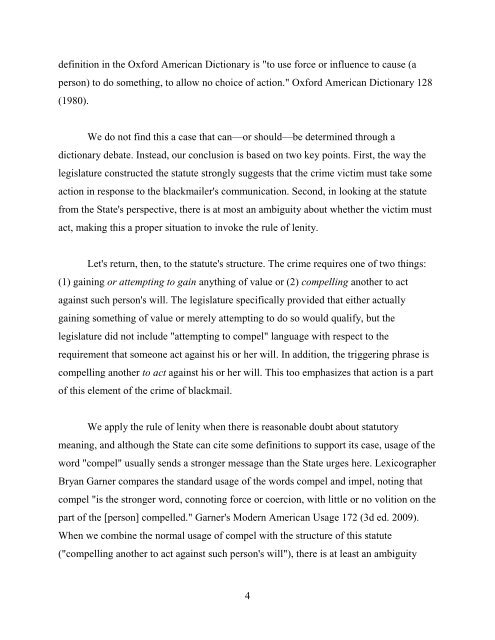Kansas Court of Appeals - 103560 â State v. Braun
Kansas Court of Appeals - 103560 â State v. Braun
Kansas Court of Appeals - 103560 â State v. Braun
You also want an ePaper? Increase the reach of your titles
YUMPU automatically turns print PDFs into web optimized ePapers that Google loves.
definition in the Oxford American Dictionary is "to use force or influence to cause (a<br />
person) to do something, to allow no choice <strong>of</strong> action." Oxford American Dictionary 128<br />
(1980).<br />
We do not find this a case that can—or should—be determined through a<br />
dictionary debate. Instead, our conclusion is based on two key points. First, the way the<br />
legislature constructed the statute strongly suggests that the crime victim must take some<br />
action in response to the blackmailer's communication. Second, in looking at the statute<br />
from the <strong>State</strong>'s perspective, there is at most an ambiguity about whether the victim must<br />
act, making this a proper situation to invoke the rule <strong>of</strong> lenity.<br />
Let's return, then, to the statute's structure. The crime requires one <strong>of</strong> two things:<br />
(1) gaining or attempting to gain anything <strong>of</strong> value or (2) compelling another to act<br />
against such person's will. The legislature specifically provided that either actually<br />
gaining something <strong>of</strong> value or merely attempting to do so would qualify, but the<br />
legislature did not include "attempting to compel" language with respect to the<br />
requirement that someone act against his or her will. In addition, the triggering phrase is<br />
compelling another to act against his or her will. This too emphasizes that action is a part<br />
<strong>of</strong> this element <strong>of</strong> the crime <strong>of</strong> blackmail.<br />
We apply the rule <strong>of</strong> lenity when there is reasonable doubt about statutory<br />
meaning, and although the <strong>State</strong> can cite some definitions to support its case, usage <strong>of</strong> the<br />
word "compel" usually sends a stronger message than the <strong>State</strong> urges here. Lexicographer<br />
Bryan Garner compares the standard usage <strong>of</strong> the words compel and impel, noting that<br />
compel "is the stronger word, connoting force or coercion, with little or no volition on the<br />
part <strong>of</strong> the [person] compelled." Garner's Modern American Usage 172 (3d ed. 2009).<br />
When we combine the normal usage <strong>of</strong> compel with the structure <strong>of</strong> this statute<br />
("compelling another to act against such person's will"), there is at least an ambiguity<br />
4
















